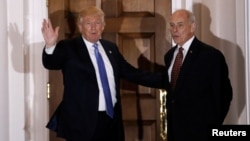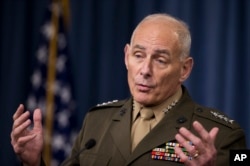U.S. President-elect Donald Trump's choice to lead the Department of Homeland Security, retired Marine General John Kelly, is one of the U.S. military's longest-serving commanders and the most senior officer since 9/11 to lose a child in combat.
Blunt-spoken and popular with military personnel, Kelly, 66, was born and raised in Boston. He initially enlisted in the U.S. Marine Corps in 1970, and was discharged from active duty as a sergeant in 1972. He returned to the Marine Corps after graduation from the University of Massachusetts Boston in 1976.
Kelly rose through the ranks to serve as the commanding general of the Multi-National Force West in Iraq from February 2008 to February 2009, and as the commander of Marine Forces Reserve and Marine Forces North in October 2009. He succeeded General Douglas Fraser as commander of U.S. Southern Command (USSOUTHCOM) on Nov. 19, 2012.
As the head of USSOUTHCOM, Kelly was in charge of the military jail at Guantanamo Bay, Cuba, and also was exposed to immigration, drug trafficking and other cross-border problems over a sprawling area that encompasses 32 countries in the Caribbean, Central America and South America.
Kelly took a tough tone on border security, warning Congress last year about the risks of smuggling rings in Mexico and Central America that spirited "tens of thousands of people," including unaccompanied children, "to our nation's doorstep."
He also clashed with the Obama administration over plans to close Guantanamo and the Pentagon's order that opened all jobs in combat units to women, including the most elite forces like the Navy SEALs.
In 2010, Kelly became the highest ranking U.S. military officer to lose a child in combat operations in Southwest Asia. His youngest son, 1st Lieutenant Robert Michael Kelly, was killed in action in Afghanistan on Nov. 9, 2010. The younger Kelly was a Marine and was on his third combat tour, but on his first combat tour as a Marine Corps infantry officer.
Since his son's death, Kelly has talked in stark terms about the threats the United States faces in the Middle East and beyond.
"Given the opportunity to do another 9/11, our vicious enemy would do it today, tomorrow and everyday thereafter," Kelly said in a 2013 Memorial Day address in Texas. "I don't know why they hate us, and I frankly don't care, but they do hate us and are driven irrationally to our destruction."





